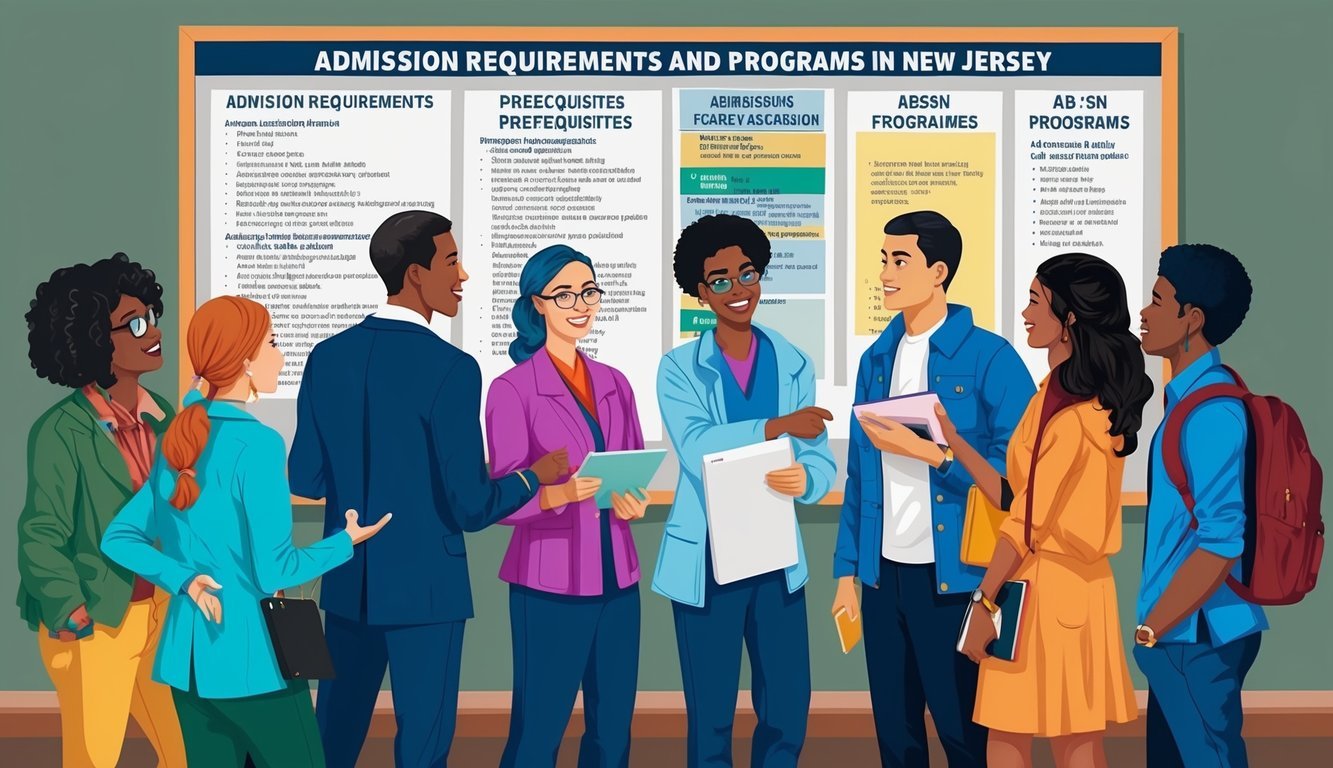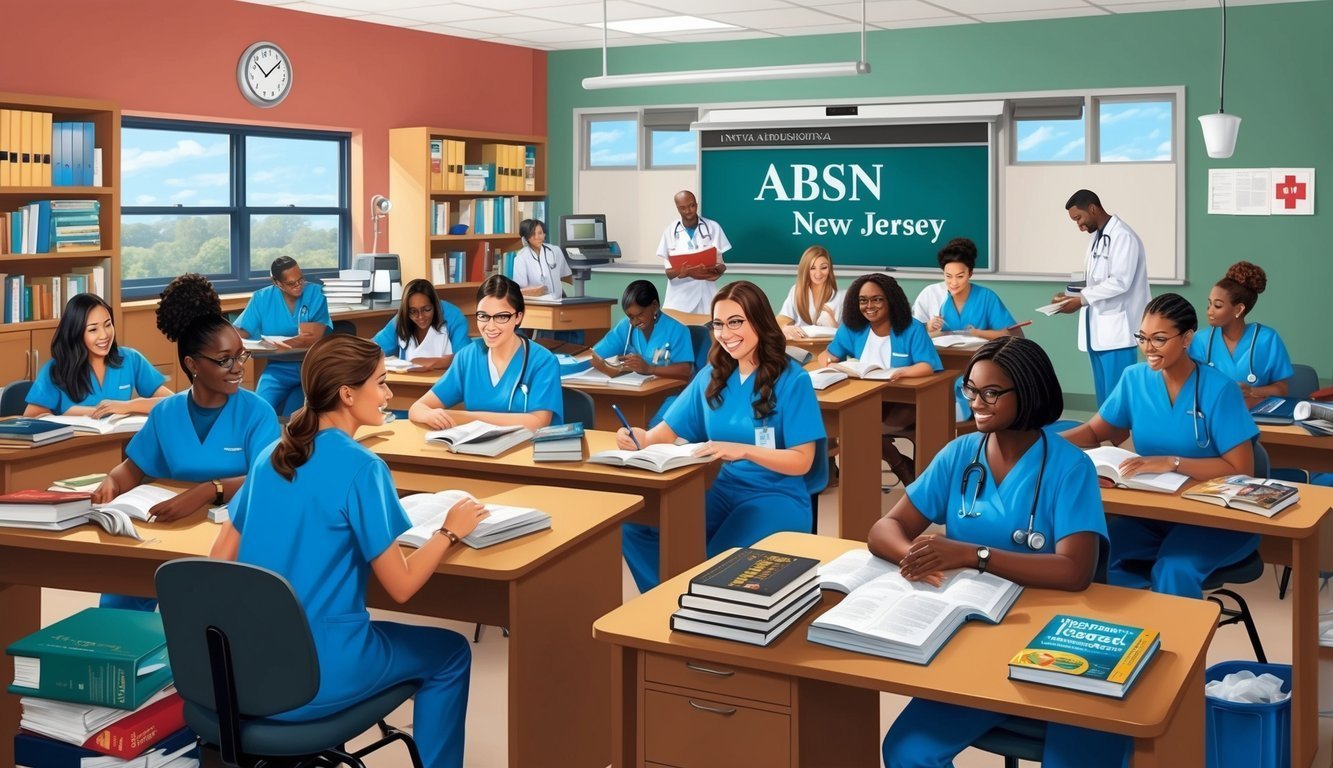Accelerated Bachelor of Science in Nursing (ABSN) programs in New Jersey offer a fast-track option for individuals who already hold a non-nursing bachelor’s degree and wish to transition into the nursing field. These programs typically allow you to earn your BSN in as little as 14 to 18 months, providing an efficient pathway to becoming a Registered Nurse (RN).
New Jersey is home to several reputable nursing programs, including options at institutions like Rutgers University and Ramapo College.
These programs are designed to build on your previous academic experience, blending essential nursing theory with hands-on clinical practice.
With the growing demand for healthcare professionals, obtaining your nursing degree through an ABSN program can put you on a promising career path.
Many programs, such as those offered at Rutgers University and Ramapo College, have specific admission criteria and deadlines, making it essential to research your options to find the best fit for your goals.
Exploring ABSN Programs in New Jersey

New Jersey offers several options for those seeking to pursue an Accelerated Bachelor of Science in Nursing (ABSN).
These programs cater to individuals with prior degrees, allowing them to transition into nursing careers efficiently.
The highlighted programs each provide unique features, making them suitable for diverse student needs.
Rutgers University ABSN Overview
Rutgers University features a prominent ABSN program that combines rigorous coursework with clinical experience.
The program is designed for individuals who hold a non-nursing bachelor’s degree.
- Location: Offered at Newark and New Brunswick campuses.
- Format: Full-time, approximately 12 months to complete.
- Key Requirements: Candidates must complete prerequisite courses; Rutgers offers 9 of these prerequisites online.
You have two crucial admission deadlines—February 15 for summer admission and October 1 for spring admission.
The Rutgers program emphasizes evidence-based practice, preparing you to meet the demands of modern healthcare.
Felician University ABSN Highlights
Felician University provides a unique ABSN program that focuses on a holistic approach to nursing education.
Located in Lodi and Rutherford, this program aims to develop compassionate, skilled nurses ready for various healthcare settings.
- Program Length: Typically completes in 16 months.
- Clinical Experience: You will engage in extensive hands-on training.
Felician University also emphasizes small class sizes, fostering personalized instruction.
The curriculum integrates ethical decision-making and community service, preparing you to contribute meaningfully to society.
New Jersey City University Nursing Tracks
New Jersey City University (NJCU) has designed an ABSN program that combines innovative technology with traditional teaching methods.
This program offers flexibility for working professionals aiming to transition into nursing.
- Duration: Accelerated format allows completion in about 13 months.
- Location: Primarily based in Jersey City.
NJCU focuses on cultural competency and serving diverse populations, making this program particularly relevant today.
The comprehensive clinical rotations equip you with real-world nursing skills, ensuring you are job-ready upon graduation.
Admission Requirements and Prerequisites

When considering an Accelerated Bachelor of Science in Nursing (ABSN) program in New Jersey, understanding the specific admission requirements and prerequisite courses is crucial.
This ensures you are well-prepared and eligible for your desired program.
Essential Prerequisite Courses
Before applying to an ABSN program, you must complete several specific prerequisite courses.
These typically include:
| Course | Credit Hours |
|---|---|
| Microbiology | 4 |
| General Chemistry | 4 |
| Organic Biochemistry | 4 |
| Anatomy and Physiology | 8 |
| Nutrition | 3 |
You need to ensure that you have earned a grade of “C” or better in each course.
Additionally, some programs may require a non-nursing bachelor’s degree or at least 60 credit hours from an accredited institution to qualify for admission.
Admission Criteria and Recommendations
Along with prerequisite coursework, you should be aware of the general admission criteria.
Most ABSN programs require:
- A completed application form
- Official transcripts from all post-secondary institutions
- Letters of recommendation from professionals in the field
These recommendations can highlight your potential for success in the nursing program.
It’s also beneficial to demonstrate volunteer or work experience related to healthcare, as this enhances your application.
Be sure to check individual program websites for specific requirements, as they can differ across institutions.
Curriculum and Clinical Training

In ABSN programs, the curriculum combines essential nursing theory with practical clinical training.
This balance prepares you for various roles within the nursing profession while emphasizing patient care and clinical competencies.
Key Coursework in ABSN Programs
Your coursework in an Accelerated BSN program typically spans a range of subjects crucial for nursing.
Key areas of study include:
- Nursing Theory: Understanding fundamental nursing concepts and philosophies.
- Pharmacology: Learning about medications, their effects, and safe administration practices.
- Health Assessment: Gaining skills to evaluate patient health through examinations and diagnostics.
Courses are designed to be intensive and often utilize a cohort model, promoting collaboration among students.
Expect to engage in case studies, simulations, and group projects to enhance your learning experience.
Most programs require you to maintain up-to-date health requirements and prepare for CPR certification as part of your educational journey.
Clinical Experience and Rotations
Clinical training is a vital component of ABSN programs.
You will participate in clinical rotations that provide hands-on experience in various healthcare settings.
These rotations may include:
- Hospitals
- Clinics
- Community Health Settings
You’re expected to apply your classroom knowledge in real-world scenarios, gaining proficiency in patient care under the supervision of experienced nurses.
Each clinical placement focuses on developing critical skills such as patient assessment, communication, and teamwork.
Your successful completion of these clinical experiences will prepare you to take the NCLEX exam, allowing you to become licensed as a Registered Nurse.
Career Outcomes and Nursing Licensure

Graduating from an Accelerated Bachelor of Science in Nursing (ABSN) program positions you well for a successful nursing career.
Key components include preparing for the NCLEX-RN examination and understanding the prospects within the nursing workforce.
Preparing for the NCLEX-RN Examination
As you complete your ABSN program, a significant milestone will be preparing for the NCLEX-RN.
This examination is essential for obtaining your Nursing License and practicing as a Registered Nurse (RN).
To ensure success, consider the following strategies:
- Study Resources: Utilize review books, online courses, and practice tests.
- Study Groups: Collaborate with peers to enhance learning.
- Scheduled Practice: Set aside regular times for focused study sessions.
Passing the NCLEX-RN validates your competency as a nursing professional, ultimately impacting your career opportunities.
Prospects in the Nursing Workforce
The nursing workforce continues to experience strong demand.
Factors contributing to job prospects include:
- Aging Population: Increased healthcare needs due to an aging demographic.
- RN Salary: The average RN salary in New Jersey is around $111,210 annually, providing a lucrative career path.
In addition, obtaining your nursing license opens doors in various settings, including hospitals, clinics, and community health organizations.
The projected job growth for RNs is robust, with the U.S. Bureau of Labor Statistics forecasting a 6% increase from 2021 to 2031.
This growth highlights the importance of your qualifications in meeting healthcare demands.
Your commitment to passing the NCLEX-RN and securing your nursing license will significantly shape your career trajectory.
Tuition, Costs, and Financial Planning
Understanding the financial landscape of Accelerated Bachelor of Science in Nursing (ABSN) programs in New Jersey is vital.
You need to be aware of the tuition costs and available financial resources to make informed decisions.
Understanding Tuition Fees for ABSN Programs
Tuition for ABSN programs in New Jersey varies significantly based on the institution and program specifics.
The average cost can range from $28,706 at Rutgers University to $37,394 at Thomas Edison State University.
| University | Tuition Cost |
|---|---|
| Rutgers University | $28,706 |
| Thomas Edison State University | $37,394 |
| Felician University (Hybrid) | Variable |
| Eastwick College | Variable |
Additionally, costs can reach up to $93,000 in some private institutions.
Other factors affecting tuition include program format, online versus on-campus options, and location.
It’s essential to assess your financial situation and consider part-time employment if necessary for covering tuition and related expenses.
Financial Aid and Scholarships
Many students pursuing ABSN programs need financial aid.
Various options are available, including federal student loans, grants, and state-specific aid.
Always fill out the Free Application for Federal Student Aid (FAFSA) to determine eligibility.
Scholarships specifically for nursing students can also alleviate financial burdens.
Many universities offer scholarships based on merit, need, or specific criteria related to nursing.
Consider Nurse.org for updates on available scholarships and financial planning tips.
Making proactive financial plans can help you manage tuition costs and allow you to focus on your education and future nursing career.

